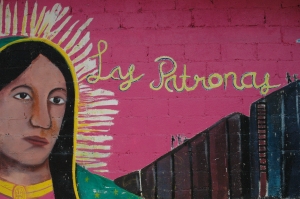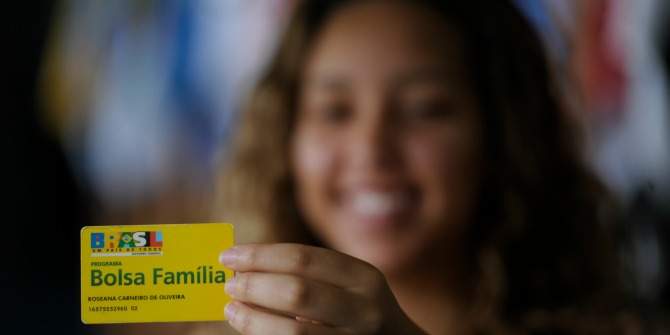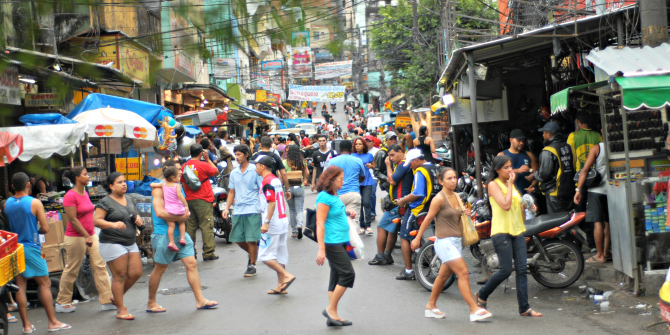 In this post, Mario Bruzzone discusses the work of Las Patronas, a grassroots group engaged in collective action in Mexico, and the strategies they have used to sustain their project for over twenty years. He argues that a combination of practices, orientations and structures enables their endeavour in the long term.
In this post, Mario Bruzzone discusses the work of Las Patronas, a grassroots group engaged in collective action in Mexico, and the strategies they have used to sustain their project for over twenty years. He argues that a combination of practices, orientations and structures enables their endeavour in the long term.
Featured image credit: Peter Haden (CC BY 2.0)
Just over a year ago, Norma Romero Vásquez stood before Mexico’s president as the newest awardee of the country’s National Human Rights Prize. She concluded her acceptance speech with a characteristic flourish:
And we ask Mr. President, Enrique Peña Nieto, to hear us, for us to create a dialogue between society and those who represent us. Because it’s not about criticising or judging those who have been wrong, or those who have betrayed the country. What is truly important in these times is to act.
The award represented a validation of years of work. Since 1995, Norma’s collective has given food, water, and clothing to impoverished migrants riding freight trains through their community, in the state of Veracruz. In the most common manifestation the women hold out plastic bags of food for migrants to reach out and grab as the trains rumble by. (They also deliver food to migrants when trains are switched onto sidings.)
Norma is the strongest personality and usual—albeit unofficial—spokesperson for the collective, known as “Las Patronas”. Recognition was long in coming; for their first 10 years, the Patronas were rural nobodies. Their small town, La Patrona, sits outside of the slightly larger Amatlán de los Reyes, itself on the periurban edge of the small city of Córdoba (2010 population: 140,000). Córdoba’s heyday was in the 19th century. Amatlán never had one.
With the release of the documentary De Nadie in 2005, life changed drastically. By the time I first visited La Patrona in 2011, De Nadie had become enshrined as the movie that made their names—which is ironic, because the film doesn’t identify by name the collective or any of its members who appear. All it labels is the town: “La Patrona, embodiment of hope”.
But that was enough for others to track them down. A series of short films, articles, television profiles and awards followed. Samaritans, charities, politicians, and well-wishers materialised with aid, mostly helpful, sometimes not. One gift included 100 2-kilo bags of sugar. La Patrona is surrounded by sugarcane fields, in every direction.
The collective has largely sustained itself, even with assistance. So a question arises: How have they kept going, for two decades? What practices, what orientations, what structures have they used to sustain themselves?
For it takes more than material provisions to keep a project going for 20 years.
*
Movements, large and small, do not run themselves. People do. Motivated and talented organisers—and Norma is certainly one—can keep projects going for a long time with what appears to be sole force of will. Without something longer-term, however, the projects lose momentum and organisers eventually burn out.

Practices: A project exists as a series of everyday practices connected over time. Every day that the train passes the town of La Patrona, and every day that the Patronas give the migrants food, water, and clothing, they have accomplished something. These accomplishments are affective—something you feel—but also narrative. They provide a feeling, and provide a story. Daily accomplishments are sustaining.
To past practices, accomplishments provide a core of meaning, contextualising them within a present project (they allow me to write this, for example). They provide a vision of the future: as they awake in the morning, the Patronas know what they’re going to do today. Not everyone has that. And for the present, accomplishments are likewise foundational, defining and maintaining a character or identity that allows collective members to push past hurdles, obstacles, and barriers.
Orientations: Because people create social change, sustained projects must care for their practitioners: how people are feeling, as a practice and a disposition, as much as to material circumstances. The Patronas are quite good at attending to everyday emotional needs. It helps of course that many of the collective members are related, by blood or marriage. But I have witnessed little “time to be serious” talk, little policing of feelings. They joke around, they complain together, they chat about telenovelas. They take evening coffee together, involve themselves with other local social movements, care for families, and host numerous visitors. Such mundane and repeated events provide venues for keeping a group moving in the same direction. Or, rather, the Patronas exploit them for such purposes, combined with skills at knowing when to check in, noticing whose opinion is going unheard, recognising couched words that offer an opportunity, backing off at the right time.
The core principle is about relationship maintenance, ensuring that the group takes on the projects and ideas of individual members, that individuals feel connected to each other and to the whole, that everyone is empowered to contribute when something needs doing; and recognising that struggling together can be made to create community cohesion even when individuals disagree. But that cohesion, crucially, is not given but made.
Structures: The Patronas’ project—giving directly to migrants—is a form of direct provision. Direct provision projects have twin virtues, both empowering and validating the people who keep the projects running. Workers are empowered in small ways, through a constant engagement with situations outside “rules” or formative guidelines. Each situation’s urgency requires localised, often creative, solutions. Active decisions must be made continually. With the Patronas, collective members are also empowered in larger ways: taking responsibility for different aspects of the project from cooking to work trade to scheduling.
Direct service is also fulfilling, because the outcome is tangible. The hungry get food. Migrants—generally unaware that their train is about to cross a 2000–meter pass—are given warmer clothing. The service itself validates the project. It’s no accident that validation comes every day to the Patronas, but rather a key aspect of the project’s organisation. That validation filters through everyone who participates.
But this validation comes linked with the potential for transformation, of both individuals and the collective itself. Here’s one collective member who joined the collective within the last five years, discussing her first time helping out, giving to migrants on a stopped train:
When I passed the bag, [the migrant] told me “thank you” and “this is so great.” And can you imagine it, first he thanked me and I gave this lunch to him but this—I mentioned this look, this look of happiness of the pleasure of wow, they’re eating something. And, well, in my hands they could—there was the ability to help them. That Sunday changed my life, completely.
The possibility of “changing a life” is constitutive of the Patronas’ project. A sustainable project can be rooted to habit, certainly. But it’s often better to attach it to a transformative potential. Projects can help people recognise connections and interconnectedness that they weren’t aware of before. They can give meaning to lives, provide purpose, can direct and shape one’s orientation to the world. This is a sustainable project because it gives meaning and enables self-transformation in the lives of its participants.
*
Norma’s speech directly piqued some politicians at the ceremony. She called them, in short, traitors. While this likely created some future difficulties in working with bureaucrats, it also functions as an accomplishment—a “win”—of its own.
Back-narrated as part of a larger project, the story becomes one in which the Patronas care for those who few others will. They are unafraid to speak to power. Norma’s charge thereby reaffirms both an identity and an orientation. Norma sees migrants suffering, has seen them for nearly two decades, and has gone above and beyond to alleviate this. Others ignore the plight. Suffering is urgent.
That feeling of urgency validates the action. But it also shapes the experience. The train is enormous and unstoppable, so heavy that it presses its own tracks into the ground. It feels dangerous, and it is, because the train is utterly agnostic to your existence. And you stand beside it.
Giving to migrants is extremely fulfilling, in part because of the train, as anyone who has been part of the giving along the tracks can attest. (This includes your slightly awkward correspondent in muddy conditions here.) Indeed, it’s fulfilling even when you never meet the migrants: a project completed and, back at the kitchen and away from the smell of engine oil, an accomplishment.
Mario Bruzzone is a PhD student in the Department of Geography at the University of Wisconsin – Madison. He has known the Patronas since 2011, when he did the research for his MSc thesis in La Patrona. His PhD dissertation examines the economic integration of Central American transit migrants within Mexico. You can find him on twitter at @mario_bruzzone.
The views expressed on this post belong solely to the author and should not be taken as the opinion of the Favelas@LSE Blog nor of the LSE.
Please read our comments policy before commenting.





